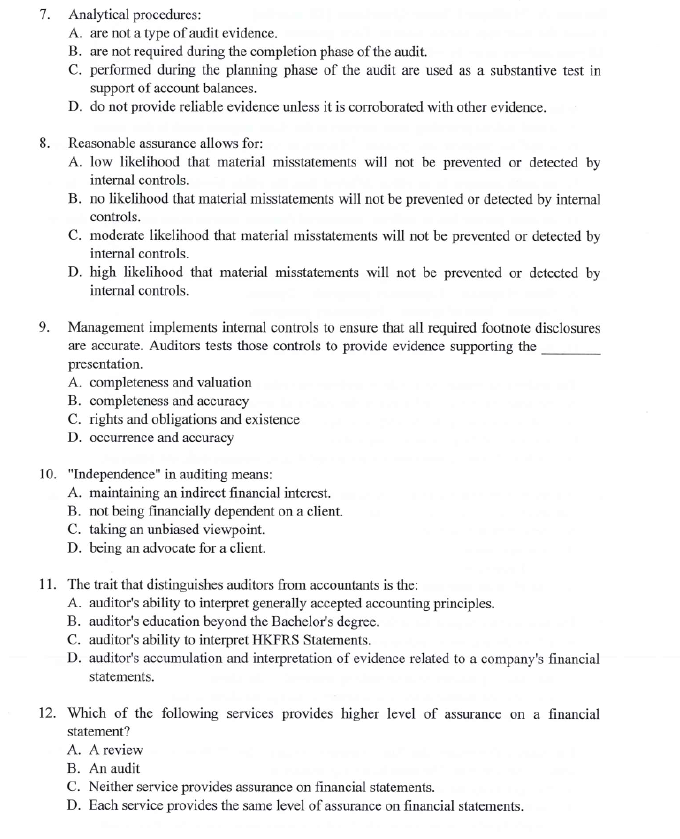7. Analytical procedures: A. are not a type of audit evidence. B. are not required during the completion phase of the audit. C. performed during the planning phase of the audit are used as a substantive test in support of account balances. D. do not provide reliable evidence unless it is corroborated with other evidence.
7. Analytical procedures: A. are not a type of audit evidence. B. are not required during the completion phase of the audit. C. performed during the planning phase of the audit are used as a substantive test in support of account balances. D. do not provide reliable evidence unless it is corroborated with other evidence.
Auditing: A Risk Based-Approach to Conducting a Quality Audit
10th Edition
ISBN:9781305080577
Author:Karla M Johnstone, Audrey A. Gramling, Larry E. Rittenberg
Publisher:Karla M Johnstone, Audrey A. Gramling, Larry E. Rittenberg
Chapter7: Planning The Audit: Identifying, And Responding To The Risk Of Material Misstatement
Section: Chapter Questions
Problem 18MCQ
Related questions
Question

Transcribed Image Text:7. Analytical procedures:
A. are not a type of audit evidence.
B. are not required during the completion phase of the audit.
C. performed during the planning phase of the audit are used as a substantive test in
support of account balances.
D. do not provide reliable evidence unless it is corroborated with other evidence.
8. Reasonable assurance allows for:
A. low likelihood that material misstatements will not be prevented or detected by
internal controls.
B. no likelihood that material misstatements will not be prevented or detected by internal
controls.
C. moderate likelihood that material misstatements will not be prevented or detected by
internal controls.
D. high likelihood that material misstatements will not be prevented or detccted by
internal controls.
9. Management implements internal controls to ensure that all required footnote disclosures
are accurate. Auditors tests those controls to provide evidence supporting the
presentation.
A. completeness and valuation
B. completeness and accuracy
C. rights and obligations and existence
D. occurrence and accuracy
10. "Independence" in auditing means:
A. maintaining an indirect financial interest.
B. not being financially dependent on a client.
C. taking an unbiased viewpoint.
D. being an advocate for a client.
11. The trait that distinguishes auditors from accountants is the:
A. auditor's ability to interpret generally accepted accounting principles.
B. auditor's education beyond the Bachelor's degree.
C. auditor's ability to interpret HKFRS Statements.
D. auditor's accumulation and interpretation of evidence related to a company's financial
statements.
12. Which of the following services provides higher level of assurance on a financial
statement?
A. A review
B. An audit
C. Neither service provides assurance on financial statements.
D. Each service provides the same level of assurance on financial statements.
Expert Solution
This question has been solved!
Explore an expertly crafted, step-by-step solution for a thorough understanding of key concepts.
Step by step
Solved in 2 steps

Knowledge Booster
Learn more about
Need a deep-dive on the concept behind this application? Look no further. Learn more about this topic, accounting and related others by exploring similar questions and additional content below.Recommended textbooks for you

Auditing: A Risk Based-Approach to Conducting a Q…
Accounting
ISBN:
9781305080577
Author:
Karla M Johnstone, Audrey A. Gramling, Larry E. Rittenberg
Publisher:
South-Western College Pub

Auditing: A Risk Based-Approach (MindTap Course L…
Accounting
ISBN:
9781337619455
Author:
Karla M Johnstone, Audrey A. Gramling, Larry E. Rittenberg
Publisher:
Cengage Learning

Auditing: A Risk Based-Approach to Conducting a Q…
Accounting
ISBN:
9781305080577
Author:
Karla M Johnstone, Audrey A. Gramling, Larry E. Rittenberg
Publisher:
South-Western College Pub

Auditing: A Risk Based-Approach (MindTap Course L…
Accounting
ISBN:
9781337619455
Author:
Karla M Johnstone, Audrey A. Gramling, Larry E. Rittenberg
Publisher:
Cengage Learning